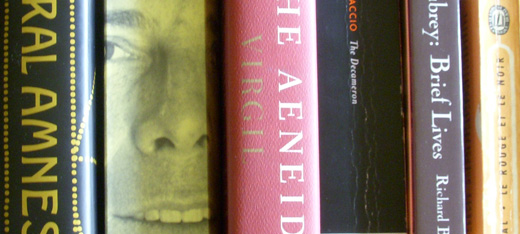Monday Morning Read
¶ Le rouge et le noir — fini. And what a shambolic finale! Whole chapters of attitude and reflection compressed into paragraphs of two sentences. Mathilde de La Môle decays into drama queenery before our eyes. Julien stoic, Julien pathetic — Julien, revolted by “le mauvais air du cachot,” cracking jokes worthy of Woody Allen:
Le pire des malheurs en prison, pensa-t-il, c’est de ne pouvoir fermer sa porte.
This novel is great fun, but even greater fun to have done with.
¶ In the Decameron, another tale of Calandrino’s assoholism (is there any other word?) It’s impossible to read this comic intrigue — once again, Calandrino allows himself to be set up by his “friends, Buffamalco and Bruno,” only to have the shit kicked out of him (is there any other way of putting it?) by his furious wife — without hearing the malign bustle of Verdi’s Falstaff in the background.
¶ In Aubrey: van Keulen, Knollys, Lacy, Lee (Harry), Lee (William), Lilly, Lister, Long, Lovelace, Lyte. Amidst all the nettles of Aubrey’s court-reporter prose, there comes this nocturnal marvel:
¶ My honoured and faithful friend Colonel James Long of Draycot, since baronet, was wont to spend a week or two every autumn at Avebury in hawking, where several times I had the happiness to accompany him. Our sport was very good, and in a romantic country, that is, the prospects noble and vast, the downs stocked with numerous flocks of sheep, the turf rich and fragrant with thyme and burnet. Nor are the nut- brown shepherdesses without their graces. But the flight of the falcon was but a parenthesis to the colonel’s facetious discourse, who was as much the son of Mercury as of Mars; and the muses did accompany him with his hawks and spaniels.
There must be at least five clever book titles tucked into that passage.
¶ In Merrill, reading miscellaneously, looking for a poem that I remember reading in The New Yorker (“164 East 72nd Street”), and coming across a late poem of almost sentimental charm, “Christmas Tree.” (The lines are worked so as to produce the right-hand silhouette of a Christmas tree.) The dying, drying tree is the poet himself.
No dread. No bitterness. The end beginning. Today’s      Dusk room aglow
     For the last time
     With candlelight.
     Faces love lit,
     Gifts underfoot.
Still to be so poised, so
Receptive. Still to recall, to praise.
¶ Clive James on G K Chesterton, and on the nature of classics. I might have wished for something longer, brighter. But this is very good: “A work of art has to be judged by its interior vitality, not by its agreed prestige.” Why is this so difficult for people to understand? Do they fear the “relativism” that’s implicit in the idea that we reconstitute not just “the canon” but the world itself every day? That “Petrarch’s long poems in Latin, which he thought were his real claims to fame,” will not be read if they lose their interior vitality? For the world and all the great things in it are just as mortal as you and I.

